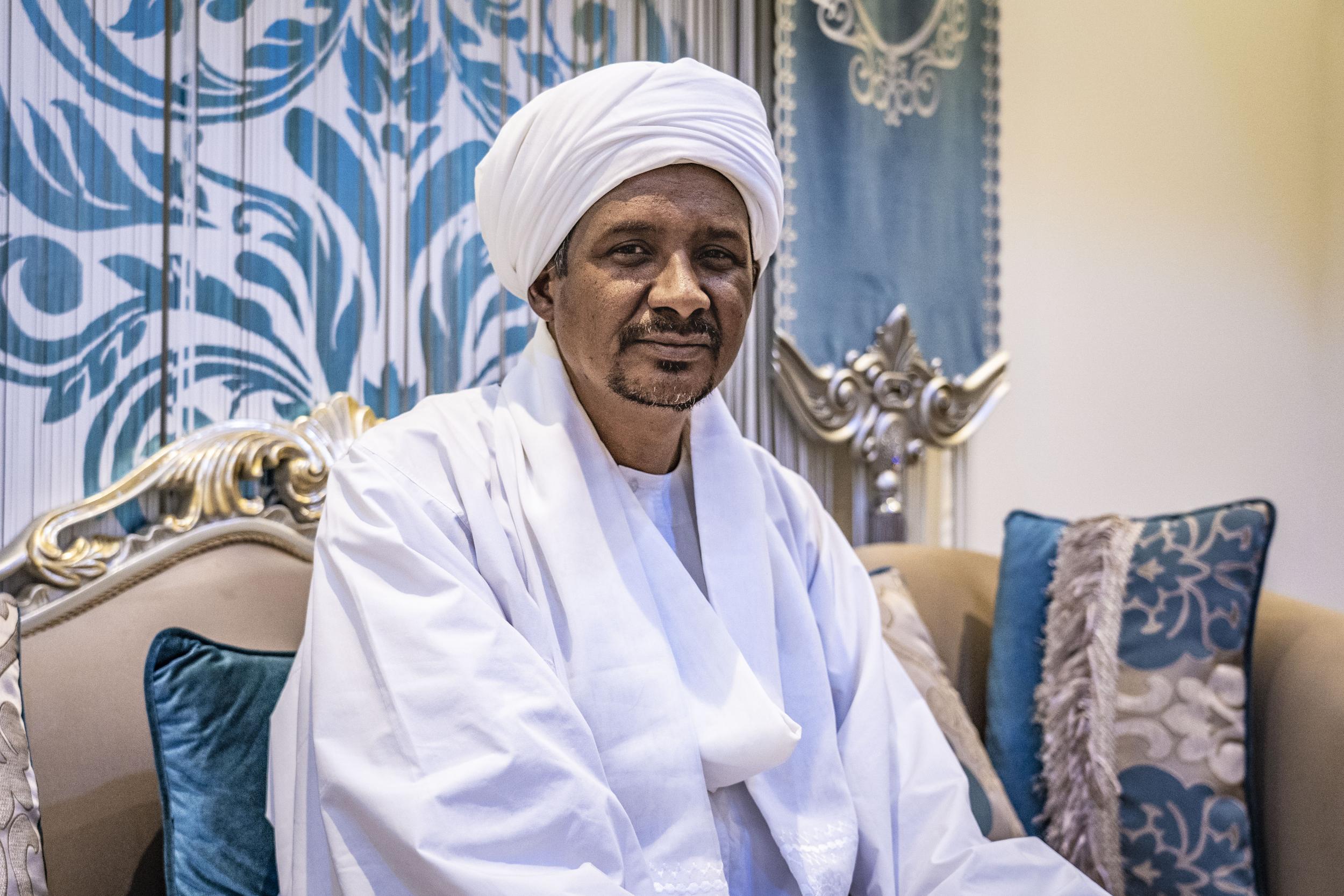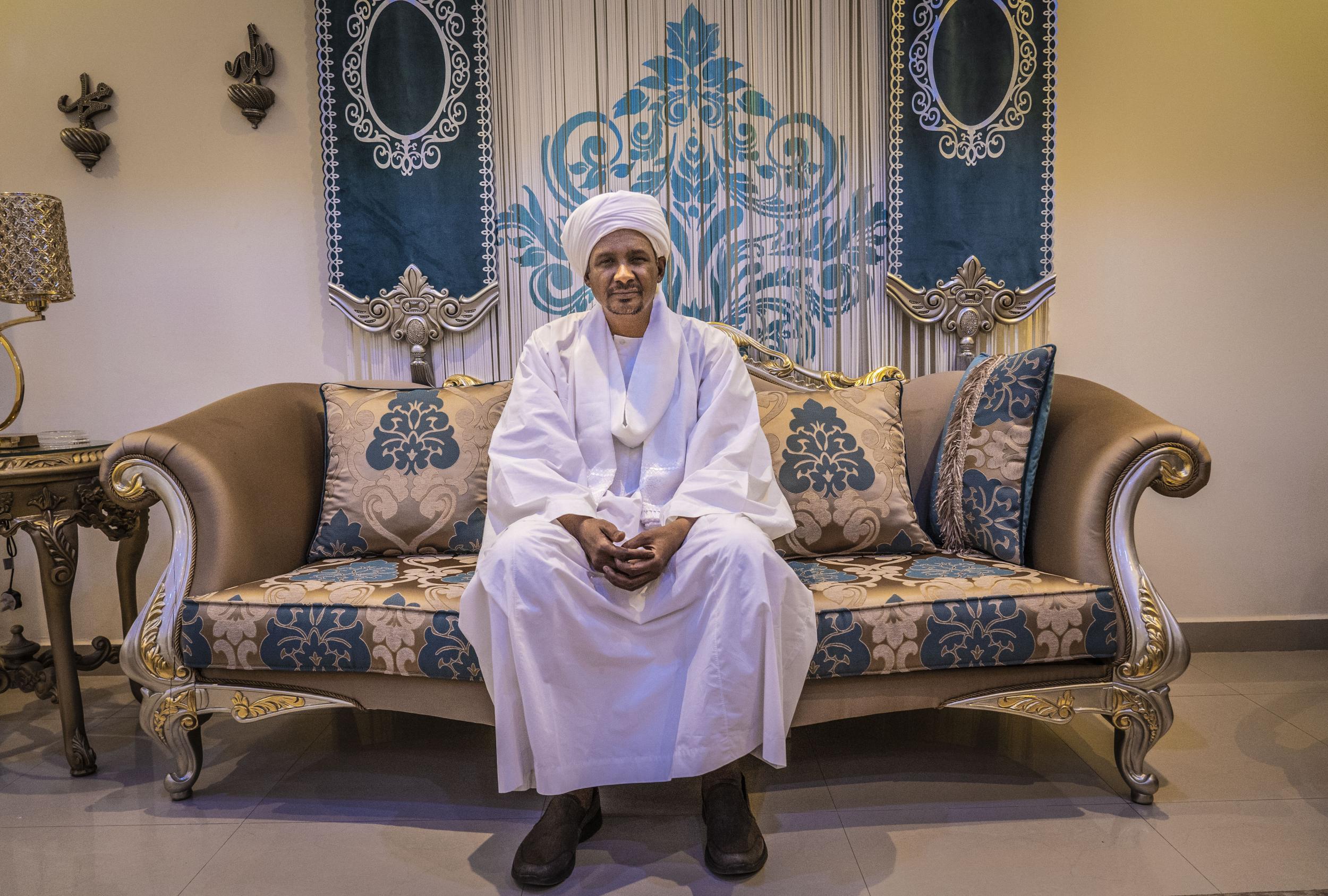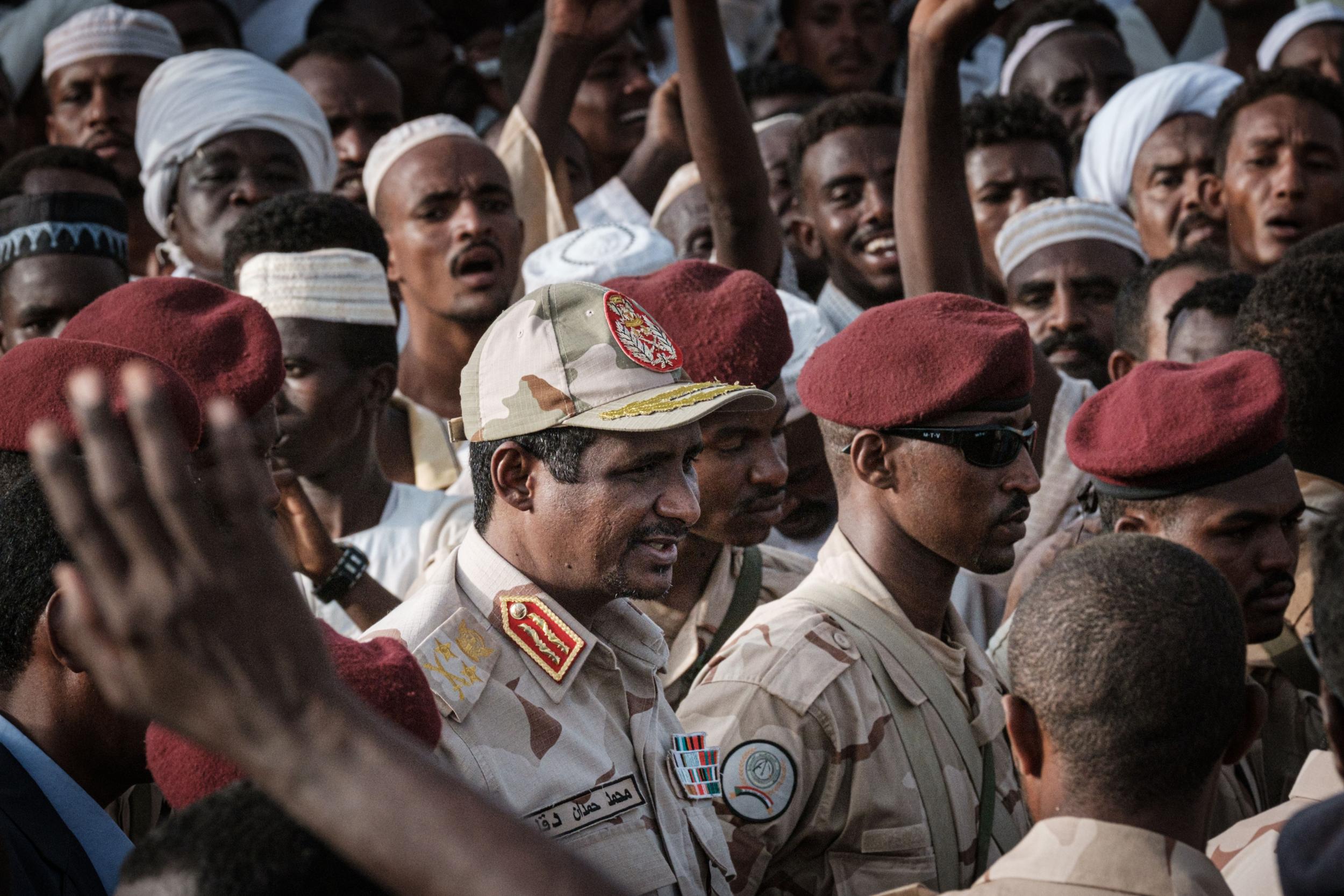Genocide, gold and foreign wars: Sudan’s most feared commander speaks out
Exclusive Interview: In a rare meeting with foreign press, General Mohamed ‘Hemedti’ Hamdan Dagalo talks to Bel Trew about the crimes his militia is accused of and a future partnership with the UK


Your support helps us to tell the story
From reproductive rights to climate change to Big Tech, The Independent is on the ground when the story is developing. Whether it's investigating the financials of Elon Musk's pro-Trump PAC or producing our latest documentary, 'The A Word', which shines a light on the American women fighting for reproductive rights, we know how important it is to parse out the facts from the messaging.
At such a critical moment in US history, we need reporters on the ground. Your donation allows us to keep sending journalists to speak to both sides of the story.
The Independent is trusted by Americans across the entire political spectrum. And unlike many other quality news outlets, we choose not to lock Americans out of our reporting and analysis with paywalls. We believe quality journalism should be available to everyone, paid for by those who can afford it.
Your support makes all the difference.The messaging was clear as soon as Mohamed Hamdan Dagalo entered the room.
Clad in a traditional white jalabiya, or tunic, and headdress, Sudan’s most powerful man known "as Hemedti" looked more like the camel trader he once was, rather than the chief of a paramilitary force accused of raping and killing protesters in Khartoum and committing genocidal violence in Darfur.
It was a careful shift from past appearances both before and after the April revolution which ousted his boss, Sudan’s former president Omar Bashir.
Gone were his signature military fatigues and khaki baseball cap. Gone too were his offices overlooking the base of the Rapid Support Forces (RSF) he commands.
Instead, this rare interview took place within Hemedti’s residence in the capital, where he sat on a tiffany-blue gilt sofa of nail-salon decadence.
From there he was quick to urge Britain to form a partnership with the RSF, citing the militia’s supposed efforts to combat illegal migration to Europe.
“My priority is not to rule. I swear to God I see myself as Sudanese, I am a normal citizen, I am simple and have no power,” he said, with the soft paternal cadence deployed by the likes of Egyptian president Abdel Fattah al-Sisi.
“We stress to the British people that this change is a real change. True, there may be problems here and there, but they are all being handled.
“And so, we hope the UK will be close to us and build a real partnership.”
This year the billionaire militiaman made the unlikely transition from Bashir’s close confidante, who jokingly nicknamed Hemedti “Hemayti”, meaning my protector, to a leader of the very security apparatus that toppled the president.
The April revolution forced Bashir out of power and he is now in prison facing corruption charges. Hemedti, 43, became the deputy head of the country’s Sovereign Council, a joint civilian-military transitional body which runs the country for now.
But with a powerful army of soldiers in the RSF and considerable wealth behind him, he is often talked of as the real power behind Sudan’s throne. He wants to portray himself as the protector of the revolution; but the RSF he heads has a bloody history in Darfur and stands accused of continuing to carry out attacks against protesters.
No one knows exactly how many people have been killed since the conflict first erupted in Darfur in 2003, but estimates range from 300,000 to half a million dead. The fighting also displaced some 2 million people, according to the UN.
Despite a post-revolution ceasefire, over a dozen people in Darfur, including tribal leaders, told The Independent there are regular raids in the eastern Marra mountains in Darfur.

“The largest attacks on civilians in 2014, 2016, 2017 were carried about by the RSF. The UN panel of experts on Sudan and the UN assistance mission there have all said this happened against people who stayed put in eastern Marra mountains,” said Suliman Baldo from the Enough Project, an NGO that has researched the genocide.
“It is still happening today.”
This summer Amnesty published disturbing new evidence showing Sudanese government forces, including the RSF and its allied militias, continuing to destroy villages, commit unlawful killings and sexual violence.
Local media has also logged a steady track of vicious attacks and killings although no overall death toll has been officially announced.
He dismissed the claims as “systematic targeting of the RSF... by the old regime”, and called the RSF the “guardians of Darfur” and “protectors of the revolution”.
“Who is guarding Darfur? Who is guarding the internally displaced? Who is compensating them? Who is bringing the rights of the people back? It is us,” he continued, his voice scaling in pitch.
“And our top priority right now is the success of the civilian government.”
He also batted off other allegations of violence in the capital.
Last month, Human Rights Watch published an investigation largely blaming the RSF for the 3 June break-up of an anti-government sit-in Khartoum during which at least 120 were killed.
The commander conceded his forces were “not angels” and there “may have been crimes” in the past, but insisted there was internal accountability, including an investigation into the sit-in raid.
Sliding way from the rhetoric of previous interviews, where he had spoken of his forces being goaded into action by “unspeakable provocations”, he said instead those that committed the horrific attacks in the capital were intruders posing as RSF forces.
“The break-up of the sit-in was actually a coup,” he continued, saying at least 200 people had been arrested for impersonating his men in an attempt to discredit his forces.
“We found that some officers attached to us, different ranks, including brigadiers and major generals, from the time of the old regime were responsible,” he added.
Accusations of violence aside, Hemedti was keen to address the tricky subject of gold, one of Sudan’s most valuable and also controversial assets.
Just days after Bashir’s fall, Hemedti claimed in a televised address he had deposited $1bn in Sudan’s Central Bank sourced from the trading of gold and money paid to the RSF by the Gulf to fight in Yemen.
It sparked a slew of investigations into his family’s company Al Gunade, which is said to work in areas ranging from transport and construction, to running mines in Darfur and South Kordofan – all guarded by RSF soldiers. The gold business is so successful, they allegedly fly planeloads of gold bars to Dubai.
Hemedti has since downplayed his relationship to the country’s gold rush. In this interview, the commander frames himself as a tax-paying patriot who had “partnerships” and “shares” in companies, separate to the work of the RSF.
“I don’t have mines ... There is only one mine in Jabal Amer and some partnerships with others,” he continued, though somewhat falteringly.
“We pay taxes. We pay Zakat [Islamic charitable donations]. We pay customs. We pay export fees,” he insisted.

He wanted to emphasise that Al Gunade operates legally and the RSF does not “mix power with trade”.
But government and industry sources, as well as eyewitnesses, paint a slightly different and more shady picture. In North Darfur’s capital El-Fasher there are tales of night flights to the Emirates with planes loaded with gold.
“I actually saw one of the trucks once, the gold bars spilled out, and they shut the entire airport down,” said one resident, who asked to remain anonymous.
In a recent Reuters investigation, current and former government officials, as well as gold industry sources, said that Bashir had given first Hemedti “free rein” to sell gold through this family firm Al Gunade in 2018, when Sudan’s economy was imploding.
In return, Hemedti would hand some of its export earnings to the state, to pay for the government’s fuel and wheat purchases. Airway bills and invoices obtained by the newswire showed that over a four-week period in 2018, Al Gunade sent around $30m of gold bars to Dubai, around a ton in weight.
Al Gunade’s spokespeople denied any wrongdoing and any connection with Hemedti or the RSF. But in this interview, Hemedti spoke of the company as if he was part of it.
He is also believed to have profited substantially from the war in Yemen. Over the last few years, thousands of RSF fighters have fought in Yemen for Saudi Arabia, the United Arab Emirates and their allies the Yemen government against the Iran-backed Houthis.
RSF officers and Sudanese journalists investigating the RSF told The Independent the Gulf paid Hemedti billions of dollars for the use of the soldiers who occasionally lead the assaults against the Houthis, but were largely deployed to secure recently captured cities. At great risk, they also acted in a bodyguard capacity for the UAE forces on the ground.
“It’s lucrative,” one officer said. He claimed profits were made by converting the dollar payments into Sudanese pounds using better black-market exchange rates, before paying salaries in local currency and pocketing the difference. Hemedti denies all of this vehemently, adding said the RSF were withdrawing from Yemen.
“It was an agreement regarding the legitimacy in Yemen,” Hemedti said of the reason to join the war.
“The state took that decision, we have only been ordered. It is not a personal agreement,” he added.
With the possibility of a complete withdrawal from Yemen, he sought to portray the future of the RSF as taking centre stage in the battle against terrorism and illegal migration from North Africa to Europe.
The EU has poured millions of euros into Sudan to try to stop the flow of migrants through the country. Mr Baldo, who investigated this, said the money has ended up in the pockets of the RSF that committed abuses. Hamdan insisted the RSF “saved” migrants and “was working in place of the EU”.
The tale of this powerful commander is one of rags to riches.
Born into a sub-clan of the powerful Arabic Rizaget tribe, he started life as a nomadic camel trader in Darfur, Sudan’s western region. After dropping out of school early, he helped establish the family livestock business, selling animals across Sudan and even exporting to Egypt.
His personal fortunes changed when he joined what was then known as the “Janjaweed”. The hodgepodge force of local militias and Arab tribesmen that was furnished with weapons by Bashir in 2003 to battle rebels who had taken up arms against the government they accused of oppressing Sudan’s non-Arab population.
Rights groups say that Bashir used these forces to launch ground, air and even chemical-weapon attacks on rebels and civilians, prompting wave after wave of displacement in a campaign that amounts to ethnic cleansing. In 2009 and 2010 the International Criminal Court issued an arrest warrant against Bashir on charges of genocide over the killings.
It was in this bloody period that Hemedti steadily rose through the ranks to become a prominent mid-range commander, but it wasn’t until 2013 when he really made a name for himself. Bashir promoted him to head the newly formed RSF to quell an internal rebellion from within the latest iteration of the Janjaweed.
While the former regime has tarnished Europe’s opinion of Sudan, post-revolution times had changed, he insisted.
“The RSF does a lot more than this but the good side is not visible. I can talk about their efforts for a month without finishing.”
With additional reporting by Mohammed Alamin
Read the first part in Bel Trew’s A Nation on the Edge series, here: ‘Isis will be small fry’: Sudanese PM warns country will implode unless US sanctions are lifted; the second part here: ‘It’s like Bashir is still here’: Inside war-ravaged Darfur where deadly violence is killing the revolution; the third part here: Women do not protest to be fetishised – their bravery should be better supported and the fourth part here: ‘It’s a luxury to go to The Hague’: Sudanese dictator Bashir faces trial verdict – but victims fear he’ll evade justice
Join our commenting forum
Join thought-provoking conversations, follow other Independent readers and see their replies
Comments